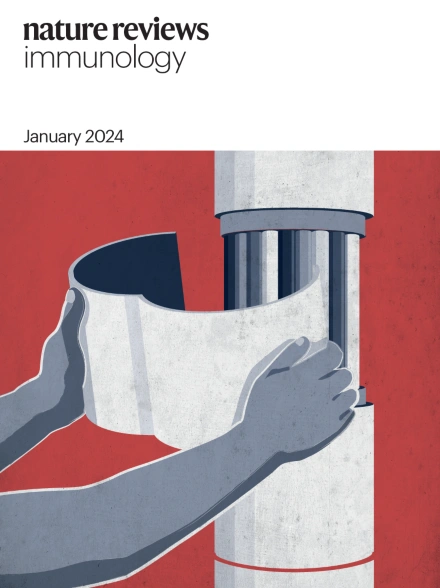How stem cells respond to infection, inflammation and ageing.
IF 60.9
1区 医学
Q1 IMMUNOLOGY
引用次数: 0
Abstract
Stem cells maintain tissue architecture by replacing differentiated cells at steady state and upon injury. Implementing this cornerstone role requires protection of stem cells from pathogens and from the toxic effects of immune system activation. However, the pro-inflammatory innate immune mechanisms that protect differentiated cells from infection are poorly functional in stem cells. Instead, stem cells employ other specific defence mechanisms, such as antiviral RNA interference. At steady state, the proliferation and differentiation of tissue stem cells is regulated by multiple cell types, including immune cells. Following sterile tissue injury or during infection, the immune response - in addition to controlling pathogens and clearing cell debris - orchestrates tissue repair by fine-tuning stem cell activity, through direct cell-cell contacts and via inflammatory mediators such as cytokines. There is thus stem-immune cross-talk that is fundamental to the maintenance of tissue homeostasis. Inflammageing, which is defined as the age-driven elevation of inflammation and is associated with an altered immune cell composition, profoundly affects this stem-immune cross-talk, impacting the ability to repair tissues and participating in ageing of the whole organism.干细胞如何应对感染、炎症和衰老。
干细胞在稳态和损伤时通过替代分化细胞维持组织结构。实现这一基石作用需要保护干细胞免受病原体和免疫系统激活的毒性影响。然而,保护分化细胞免受感染的促炎性先天免疫机制在干细胞中功能不佳。相反,干细胞采用其他特定的防御机制,如抗病毒RNA干扰。在稳定状态下,组织干细胞的增殖和分化受多种细胞类型的调控,包括免疫细胞。在无菌组织损伤或感染期间,除了控制病原体和清除细胞碎片外,免疫反应还通过直接的细胞间接触和细胞因子等炎症介质,通过微调干细胞活性来协调组织修复。因此,茎-免疫相互作用是维持组织稳态的基础。炎症被定义为年龄驱动的炎症升高,与免疫细胞组成的改变有关,它深刻地影响了这种干细胞-免疫的相互作用,影响了组织修复的能力,并参与了整个生物体的衰老。
本文章由计算机程序翻译,如有差异,请以英文原文为准。
求助全文
约1分钟内获得全文
求助全文
来源期刊

Nature Reviews Immunology
医学-免疫学
CiteScore
93.40
自引率
0.40%
发文量
131
审稿时长
6-12 weeks
期刊介绍:
Nature Reviews Immunology is a journal that provides comprehensive coverage of all areas of immunology, including fundamental mechanisms and applied aspects. It has two international standard serial numbers (ISSN): 1474-1733 for print and 1474-1741 for online. In addition to review articles, the journal also features recent developments and new primary papers in the field, as well as reflections on influential people, papers, and events in the development of immunology. The subjects covered by Nature Reviews Immunology include allergy and asthma, autoimmunity, antigen processing and presentation, apoptosis and cell death, chemokines and chemokine receptors, cytokines and cytokine receptors, development and function of cells of the immune system, haematopoiesis, infection and immunity, immunotherapy, innate immunity, mucosal immunology and the microbiota, regulation of the immune response, signalling in the immune system, transplantation, tumour immunology and immunotherapy, and vaccine development.
 求助内容:
求助内容: 应助结果提醒方式:
应助结果提醒方式:


